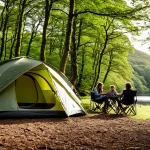Distinctive British Landscapes and Natural Diversity
When considering camping in the UK, one of the standout features is its diverse landscapes. From the rolling moors of the Yorkshire Dales to the dramatic coastlines of Cornwall, the UK countryside offers a rich tapestry of natural beauty. These varied settings provide campers with an array of experiences, whether it’s hiking through mountain trails in the Scottish Highlands or relaxing beside serene lakes in the Lake District.
Access to some of the country’s most cherished natural areas is remarkably convenient. National parks like the Peak District and Brecon Beacons, alongside numerous Areas of Outstanding Natural Beauty, make exploring the UK’s natural diversity both straightforward and rewarding. These locations are safeguarded for their scenic value and ecological significance, ensuring that visitors enjoy pristine surroundings.
This might interest you : How Can You Enhance Your Camping Experience While Traveling Through the UK?
The UK’s ecosystems support unique wildlife encounters, distinct from other regions. Camping in the UK allows enthusiasts to observe rare flora and fauna native to its different habitats—be it spotting red deer in the Highlands or coastal birds along rugged shores. This blend of diverse landscapes and unique ecosystems highlights why the UK countryside remains a premier destination for nature lovers and outdoor adventurers alike.
Historical Sites and Cultural Heritage Near Campsites
When choosing a campsite, many outdoor enthusiasts seek locations near UK historical sites camping options to enrich their experience. Camping close to heritage locations campgrounds allows visitors to explore the rich cultural tapestry that the UK offers, from ancient castles to Roman ruins. For instance, campsites near medieval castles provide a unique blend of natural beauty and historical intrigue, giving campers the chance to step back in time while enjoying modern outdoor activities.
Also to see : What Are the Best UK Camping Destinations for a Family Adventure?
Many heritage locations campgrounds are strategically positioned near UNESCO World Heritage Sites, ensuring campers can easily access iconic landmarks. These spots often serve as perfect bases for exploring famous historical walking routes like Hadrian’s Wall, where you can traverse the remnants of the Roman Empire while surrounded by stunning landscapes. Walking along Roman roads, campers not only enjoy physical activity but also immerse themselves in centuries of history embedded in the terrain.
Beyond the ruins and stone-built relics, these campgrounds offer opportunities for cultural immersion through village life and local traditions. Staying near quaint villages lets campers engage with local communities, taste traditional foods, and participate in festivals or craft fairs, adding depth to the camping experience. This blend of outdoor adventure and cultural heritage makes such campsites highly desirable for those seeking both relaxation and education during their trips.
Public Rights of Way and Walkability
In the UK, the public rights of way system forms an extensive network of public footpaths and bridleways, enabling walkers to explore the countryside with ease. This network offers a unique advantage for those planning walking routes camping trips, as it allows access through private land that would otherwise be inaccessible. The legal right to use these paths is protected, ensuring that walkers can enjoy the natural environment without trespassing.
Central to this system is the right to roam, which legally permits walkers to access certain areas beyond the established footpaths, further enhancing walkability. This right significantly contributes to the appeal of combining walking holidays with camping, creating flexible and immersive outdoor experiences. Whether following established UK public footpaths or venturing onto open-access land, the integration of these rights encourages exploration and fosters a stronger connection with the environment.
In practical terms, walking routes camping itineraries often take advantage of the interconnected footpath network, allowing travelers to move seamlessly between campsites and scenic trails. Understanding these public rights of way is essential for planning safe and enjoyable trips, making the experience both legally sound and rewarding.
Mild Climate and Year-Round Camping Potential
The UK camping climate is notably temperate, which means outdoor enthusiasts can enjoy stays for most months throughout the year. Unlike regions prone to extreme weather conditions, the UK’s climate is generally milder, reducing the risk of severe storms or heatwaves that might otherwise limit camping opportunities. This temperate balance is a key reason for the increasing appeal of year-round outdoor activities in the region.
In the spring, campers can immerse themselves in vibrant landscapes adorned with blooming bluebells, offering a picturesque and serene experience. The changing seasons bring a variety of natural highlights — for instance, autumn reveals brilliantly colored woodlands, enhancing the appeal of seasonal camping UK adventures. Wildlife activity also fluctuates with the seasons, giving campers chances to observe diverse species at different times of the year.
This consistent yet varied climate supports a broad range of outdoor experiences, making the UK an excellent choice for those seeking to camp beyond the traditional summer months. The predictability and balance inherent in the UK camping climate allow for safer, more enjoyable excursions, encouraging enthusiasts to embrace camping during all seasons.
Traditional Social Camping Culture and Local Hospitality
In the UK camping culture, social experiences often revolve around shared spaces like campfires and communal areas, fostering a warm and inviting atmosphere. Families and groups gather in these settings to enjoy storytelling, music, and the simplicity of nature, making camping more than just a solitary activity. These moments emphasize connection and relaxation in a family-friendly environment.
Nearby, village pubs and local markets complement camping trips by offering friendly hospitality and a taste of local life. These pubs serve as natural hubs for campers seeking to mingle with locals and fellow travelers. Their welcoming ambiance and traditional fare enhance the overall camping experience, creating a seamless blend of outdoor adventure and community warmth.
Special camping festivals and social gatherings further enrich the social fabric of camping. Events often focus on themes like music, crafts, or seasonal celebrations, drawing diverse groups together. Participation in these festivals showcases the vibrant, social side of camping culture, reinforcing bonds among campers and supporting local communities.
Proximity to Amenities and Accessibility for Travelers
When choosing camping amenities UK, accessibility is a key consideration. Many campgrounds are strategically located near public transport campgrounds or within easy reach of towns and tourist services. This ensures that travelers can conveniently access essential facilities such as showers, shops, and gear rentals without the need for a car.
For example, several popular campgrounds offer direct bus or train links, allowing international visitors or those new to camping in the UK to arrive stress-free. The presence of well-maintained amenities enhances the camping experience by providing comfort and convenience, which is especially beneficial for travelers unfamiliar with the area.
Moreover, attention to accessibility camping means campsites often cater to varying mobility needs, ensuring that showers and other facilities are user-friendly. This thoughtful approach makes the outdoors more welcoming for diverse groups of campers.
For first-time campers, choosing a site near public transport and local shops can simplify logistics significantly. It not only reduces travel time but also offers easy access to emergency supplies or additional camping gear. Prioritizing such amenities allows travelers to focus on enjoying their trip rather than worrying about basic necessities.


